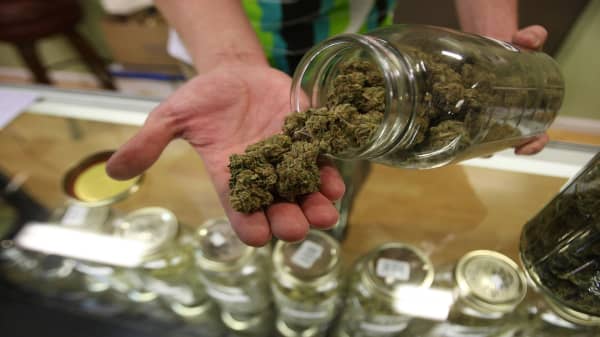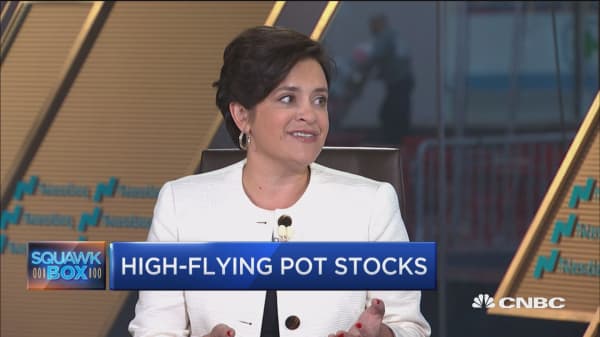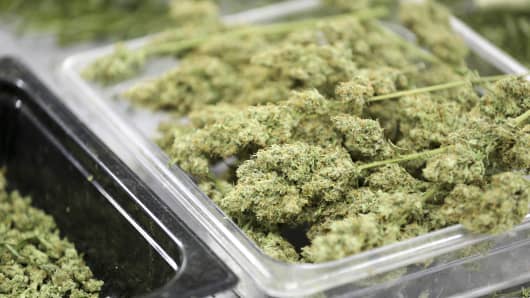
- The Canadian cannabis industry is still reeling from sky-high demand in the second week of legalization, with growers expressing frustration at the length of time it’s taking to get licensed as shelves sit empty.
- “We’re biting our nails and I think our shareholders are biting their nails too,†said Anthony Durkacz, director at FSD Pharma Inc., an Ontario-based producer that received its cultivation licence a year ago and is still waiting for its sales licence. “We want to be supplying.â€
People check out the sample counter at a cannabis store in Winnipeg, Man., on Oct. 17.Canadian Press/John Woods
Kristine Owram
The Canadian cannabis industry is still reeling from sky-high demand in the second week of legalization, with growers expressing frustration at the length of time it’s taking to get licensed as shelves sit empty.
“We’re biting our nails and I think our shareholders are biting their nails too,†said Anthony Durkacz, director at FSD Pharma Inc., an Ontario-based producer that received its cultivation licence a year ago and is still waiting for its sales licence. “We want to be supplying.â€
Every province, not just Manitoba, is receiving less cannabis than originally requested
The process of getting a sales licence from Health Canada is onerous, according to Durkacz. After receiving a cultivation license, a grower must produce two full crops, send them off for testing, get its sales software audited, and then submit a completed application for the sales licence, which can take up to 341 days to process, he said.
“So even after you’ve done everything and done everything right you could be waiting up to a year to get the licence,†he said.

Customers lineup at a government cannabis store Oct. 19, in Montreal on the third day of the legal cannabis sales in Canada. Canadian Press/Ryan RemiorzCanada became the first major economy to legalize recreational cannabis on Oct. 17, taking the lead in a global market that’s expected to reach US$32 billion in consumer spending by 2022, according to Arcview Market Research and BDS Analytics. The euphoria that sent pot stocks soaring in the lead-up to legalization has faded, with the BI Canada Cannabis Competitive Peers index losing 26 per cent over seven sessions before rebounding on Thursday.
- ‘They still don’t like you’: Why major Canadian banks remain cool to the red-hot cannabis sector
- Ontario does brisk business with 100,000 pot orders in first 24 hours
- Cannabis black market will thrive until small pot growers and sellers are included, advocates say
While some growers wait for their licences, others are struggling to keep up with demand. The government-run Ontario Cannabis Store received 100,000 orders in its first 24 hours. In Quebec, online and in-store orders totalled nearly 140,000 in the first week of legalization, and the provincial-owned retailer indicated Wednesday it may have to close some locations as producers couldn’t meet demand. Producers will have a “colossal†amount of work to do to ensure supply, the Societe Quebecoise du Cannabis said in a statement.

A man holds a bag of marijuana he bought in a cannabis store in Quebec City, on Oct. 17. Alice Chiche/AFP/Getty ImagesThe problem is that no one knew what the demand curve would look like after a century of prohibition, said Bruce Linton, chief executive officer of Canopy Growth Corp., which has secured more than a third of total Canadian supply committed to date.
Canopy shipped approximately 1 million orders of medical cannabis in its first four years of operations. It expects to ship more than 1 million units of recreational pot in the first four weeks after legalization, Linton said.
‘Just Outstanding’
“The response has been pretty unbelievable,†Linton said. “I don’t think everything will run out but you might not be able to get the identical stuff you got last time.â€
He added that Canopy is sending out orders as fast as it can pack and ship them, but there have been delays in getting new product up on the provincial websites. It will start shipping out new products, including Tweed-brand gel caps and pre-rolled joints, over the next week and a half.

Bruce Linton (left), Canopy Growth CEO, in St. Johns, Newfoundland sells the first gram of legal pot at the Tweed store at the stroke of midnight Oct. 17. Julie Oliver/PostmediaInitial demand at Alberta Gaming, Liquor and Cannabis was “just outstanding,†said Chara Goodings, a spokeswoman for the government regulator that’s overseeing sales in the western province. “But it has created some struggles with our supply level.†Very few producers have been able to deliver what was agreed upon, she said.
Dried Bud
The situation is similar in Manitoba, where Winnipeg-based Delta 9 Cannabis Inc. only has dried bud on its store shelves as it has been unable to get any shipments of cannabis oils or gel caps, said spokesman Gary Symons. In the first seven days, Delta 9 saw close to 9,600 transactions totalling $736,124 in revenues. The company is now selling about $50,000 worth of product a day.
“Every province, not just Manitoba, is receiving less cannabis than originally requested,†Susan Harrison, spokeswoman for Manitoba Liquor & Lotteries, said in an email.
Aphria Inc. CEO Vic Neufeld predicted the supply shortages on the company’s earnings call five days before legalization. Citing supply-chain issues, labor shortages and delays in getting licences and excise stamps from the government, Neufeld said Aphria would be unable to meet demand in the first two to three months after legalization. The company was forced to destroy almost 14,000 plants worth $979,000 in the last quarter due to a lack of qualified greenhouse workers.
Extra Staff
There are currently 132 licensed producers in Canada and “many more are in the queue,†said Canadian Health Minister Ginette Petitpas Taylor. Health Canada has hired 300 additional staff to evaluate applications, she said. But the process, which includes background checks, is time-consuming and it’s important to not cut corners, she said.
“There’s not a mass shortage of cannabis around the country right now,†only certain strains that have sold out, Petitpas Taylor said. “We really have all hands on deck, we want to do what we can, but in no way am I going to compromise this new regime.â€
The challenge for the government is balancing public safety with a desire to eradicate the illicit market, said Deepak Anand, vice president of business development and government relations at Cannabis Compliance Inc., a consulting firm for pot companies which is currently working on “hundreds†of licensing applications.
“Health Canada’s trying to balance quality and public safety with the need for getting more product on so that they can eliminate the black market,†Anand said. “Sometimes these goals conflict and compete with each other.â€
The only near-term solution to the supply shortage, according to Durkacz at FSD Pharma, is to allow retailers to sell product sourced from the black market.
“You would instantaneously have a supply-demand balance and then you could try to convert people from the black market to the legalized market,†he said. “That’s probably the only way to solve this in the short term.â€
Source: https://business.financialpost.com/cannabis/cannabis-business/marijuana-shortages-abound-in-canada-amid-licensing-rigmarole





.1539176161784.jpeg)


